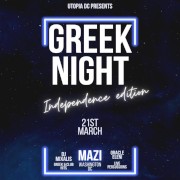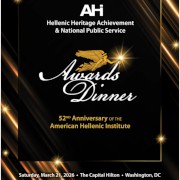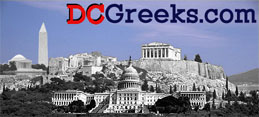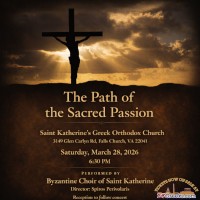|
|
|||||||||||||||
|
Forget The Economy, Greeks are Still Willing to Spend Money to Have a Good Time March 27, 2009 Some of the events in DC this year have likely been helped by the bad economy. The Petrelis concert for example, probably the biggest event we’ve seen in DC in years, was by no means a cheap ticket, but it beat seeing the same show in some destination location that would have required a flight, hotel stay, or a couple of nights of losing at the craps tables. (Ok, it also helped DC that the tour skipped Atlantic City altogether and that DC didn’t get stuck with the restaurateur-friendly but otherwise work-week wrecking Sunday night show.) The Pancyprian Dinner Dance and the Cretan Musical Evening with Zoidakis in late January and February were both sellouts based on the promise of a night of good entertainment at a moderate price. The biggest surprise of the season was the early sellout of the American Hellenic Institute’s 34Institute’s 3 Anniversary Hellenic Heritage Achievement and National Public Service Awards Dinner. At $300 a plate, this is the most expensive annual event for the Greek community in DC, and normally getting young adults to attend this event is difficult not only for the price but for the perception that it’s going to be a night of long acceptance speeches from people they’ve probably never heard of, introduced by even longer speeches from people they’ve definitely never heard of. But AHI has made an effort to honor more (pop) culturally relevant Greek-Americans (like this year’s award recipients Iron Chef Cat Cora and novelist and screenwriter George Pelecanos) and have been able to subsidize much of the young adult attendance. This year was there best attended event ever with over 400 people in the crowd, and enough young adults there where AHI told us to stop advertising it. The local young adult turnout wasn’t as surprising as those young adults who came from Philadelphia, New York, Cleveland, and as far away as Los Angeles for the event. These young adults particularly from places like New York that are no strangers to black tie Greek events, commented on the classiness of the event, and that how despite the open bar and after-party atmosphere, the event didn’t turn into a meat-market like some of the other destination events for Greek young professionals. The only slight disappointments of the season thus far have been the Greek Nights or lack thereof. Outside of the Petrelis after-party Greek Night, the other Greek Nights this year haven’t been as well attended as expected. (Incidentally the Petrelis after-party Greek Night may have been one of the best Greek nights in this town in years because having the concert beforehand ensured that everyone arrived to Greek Night all at once and helped get the mandatory standing at the bar and staring at each other phase out of the way earlier in the night, which led to a much more packed and continuously flowing dance floor for the majority of the night.) The one positive side-effect of the economy perhaps has been people's willingness to take advantage of the no-cover for arriving early policy that some promoters have been offering. Last Saturday's Greek Independence Day Greek Night at Skye Lounge went out of its way to reward this early arriving crowd with a three DJ line up of DJ Manolis, DJ Yianni, and DJ Mixalis which got the Greek music started earlier than other Greek Nights that often have to cater to their typically earlier arriving non-Greek/international audience. Apparently Greek Independence Day celebrations have been the worse hit by this economy. Absent this year were the competing Greek Nights of years past. The Greek Embassy’s open house didn’t feature the normal volume of crowds of Greek-Americans rushing the sometimes un-Lenten (meat-heavy) and untraditional buffet spread. (Last year’s made-to-order gyros seemed particularly out of place, but alas it didn’t make a reappearance.) But perhaps the biggest victim of the economy is this weekend’s Greek Independence Day Parade in Greektown in Baltimore. This year’s parade has been officially scaled back to a “Commemoration,” – essentially a watered down block-party in the plaza outside of St. Nicholas Greek Orthodox Church -- because the funds couldn’t be raised to pay Baltimore for the essential police and other services to close down the five or so blocks necessary to host the parade. The lack of a parade will likely hurt the already struggling and dwindling remaining Greek-owned businesses in a Greektown that is hard pressed to keep its identity. With Pascha on April 19ha on April 1, the start of the second quarter of the year promises to be a quiet one as even Third Thursday will need to be rescheduled because of Holy Week. Our prediction will be that despite the better than expected start to the year that things won’t pick up in DC in any significant way until mid-to-late May and out of town until late June or July. Greek-Americans willingness to travel this summer may also be a victim of this economy as well. Therefore the winning formula for these rough economic times will likely be getting Greeks together for one-night only events that won’t require too much planning or out-of-pocket costs.
|



